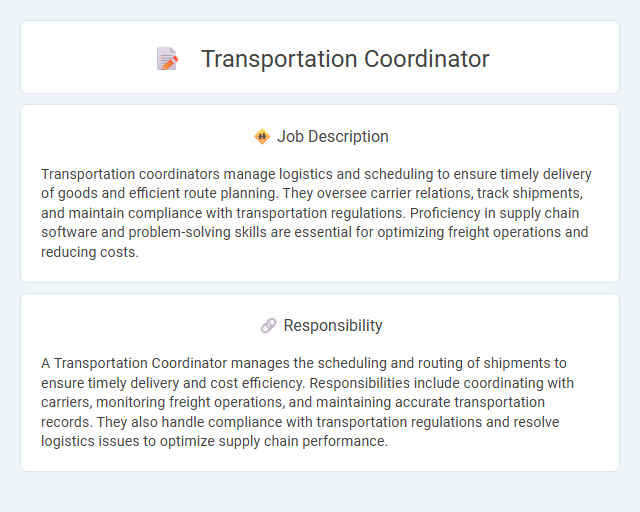
Transportation coordinators manage logistics and scheduling to ensure timely delivery of goods and efficient route planning. They oversee carrier relations, track shipments, and maintain compliance with transportation regulations. Proficiency in supply chain software and problem-solving skills are essential for optimizing freight operations and reducing costs.
Individuals who demonstrate strong organizational skills, attention to detail, and the ability to manage multiple tasks simultaneously may be well-suited for a Transportation Coordinator role. Those who thrive in fast-paced environments and possess effective communication abilities are likely to handle the coordination of schedules, routes, and logistics efficiently. Candidates with a preference for structured problem-solving and teamwork will probably find this position both suitable and rewarding.
Qualification
A Transportation Coordinator requires strong organizational skills, proficiency in logistics software, and a thorough understanding of supply chain management. Essential qualifications include a bachelor's degree in logistics, transportation, or business administration, along with experience in route planning, fleet management, and regulatory compliance. Effective communication and problem-solving abilities are critical for coordinating schedules, managing transportation teams, and ensuring timely delivery of goods.
Responsibility
A Transportation Coordinator manages the scheduling and routing of shipments to ensure timely delivery and cost efficiency. Responsibilities include coordinating with carriers, monitoring freight operations, and maintaining accurate transportation records. They also handle compliance with transportation regulations and resolve logistics issues to optimize supply chain performance.
Benefit
A Transportation Coordinator role likely offers benefits such as improved organizational efficiency and streamlined logistics processes, which can enhance overall company performance. Employees in this position might experience opportunities for skill development in supply chain management and communication. There is a probability of gaining valuable industry knowledge that can support career advancement in transportation and logistics sectors.
Challenge
The Transportation Coordinator role likely involves managing complex logistics and scheduling to ensure timely deliveries, which can present significant challenges in adapting to unpredictable variables like traffic delays and supply chain disruptions. Coordinators probably need to stay flexible and develop contingency plans to mitigate risks while maintaining cost efficiency. Effective communication with drivers, vendors, and clients is essential to navigate these difficulties and keep operations running smoothly.
Career Advancement
Transportation coordinators manage logistics, track shipments, and optimize routing to ensure efficient delivery operations. Mastery of supply chain software, leadership skills, and experience in vendor negotiation increase opportunities for promotion to logistics manager or operations director roles. Continuous education and certification, such as Certified Transportation Professional (CTP), significantly enhance career advancement prospects.
 kuljobs.com
kuljobs.com